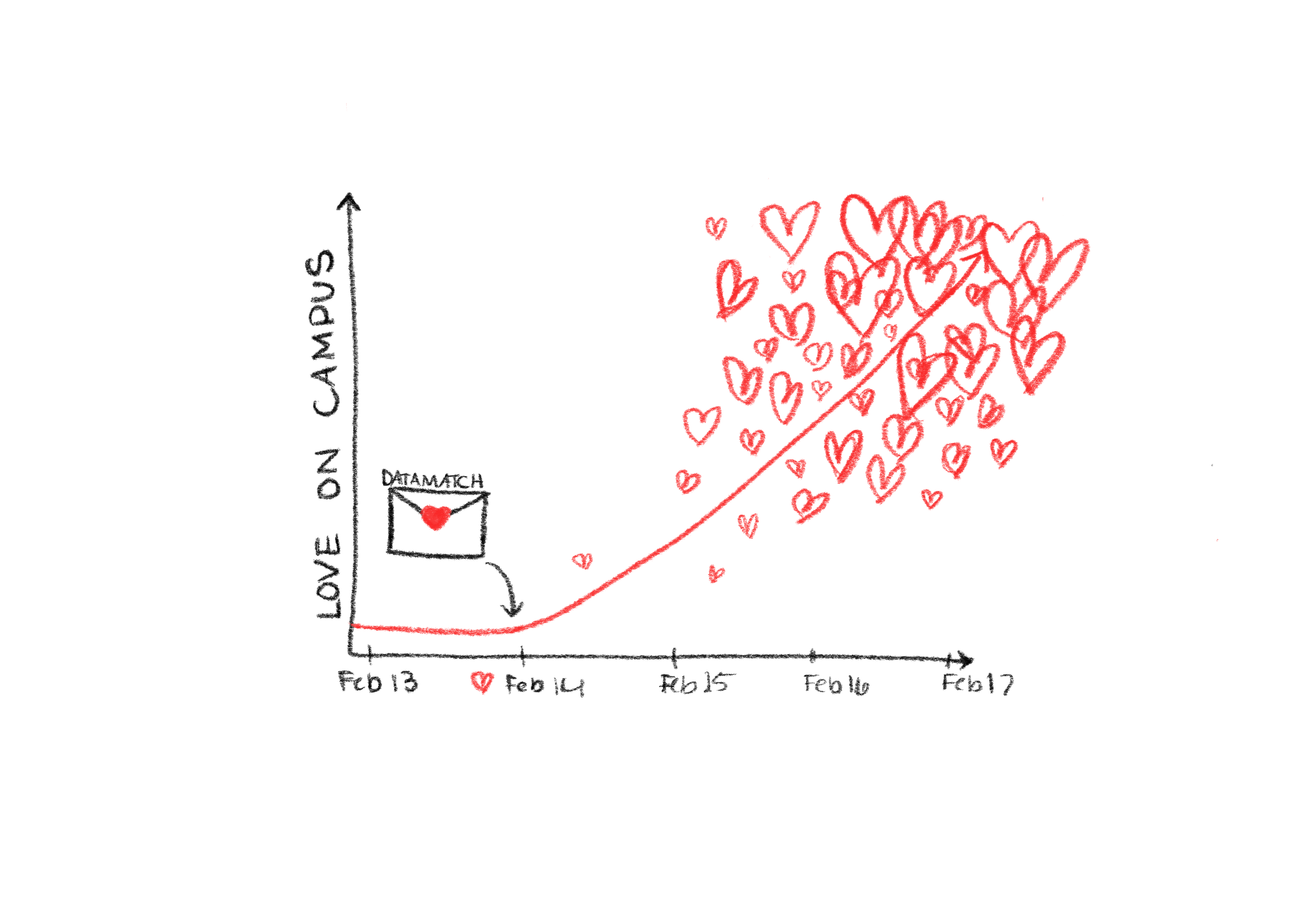Datamatch brings comedic flair to finding love on campus
February 18, 2022
 Sophie Burchell
Sophie BurchellWith Valentine’s Day in the rearview mirror, students have been reflecting on the most recent romantic phenomenon to sweep campus: Datamatch. The online matchmaking service, run by Harvard University students, arrived on campus for the first time last week.
“February can be a really sad time for people who aren’t in relationships,” Katherine Zhu, a junior at Harvard and one of the co-Presidents of Datamatch, said. “So, we really just want to bring a little more joy into people’s lives … if nothing comes out of it at least you got a laugh. And then if something does come out of it, that’s amazing, because you found a significant other or a new best friend.”
Datamatch was originally founded in 1994 by the Harvard Computer Society and has since extended to over 30 colleges across the nation. The matching process involves students completing a survey populated with comedic questions that are then processed by the Datamatch team through an algorithm.
“[The questions] are all really humorous,” Zhu said. “And we basically just use those to figure out who has similar senses of humor … that factors into how we match.”
Every school involved with Datamatch makes up its own questions and weaves in as many of their own traditions and inside jokes that can fit in 20 questions and 100 multiple choice answers. To write the questions for Bowdoin, the Datamatch team reached out to the College’s student-run “comedy magazine” over winter break.
“I think it’s just a very lighthearted, stupid, silly thing that we got to take part of,” Blaine Stevens ’22, Co-Editor-in-Chief of the publication, said. “It was all of us as a club coming together and coming up with joking questions and stuff like that, and it was really fun.”
Zhu believes it is crucial for students at each school to write questions that most accurately bring people together through shared jokes about their communities.
At Bowdoin, 956 students—nearly half of the College’s student population—participated in the matchmaking program. Zhu attributes this popularity to the advertising of Datamatch at the college.
“It’s just exciting to be a part of something where you can actually see the impact of what you’re doing,” Zhu said. “You can see people like going on dates, you can hear people talking about Datamatch, taking the survey in dining halls. To really be able to see with your own eyes the tangible impact you’re creating on everyone is a really exciting thing to be a part of.”
Additionally, Zhu attributes the program’s success to its uniqueness. Unlike Marriage Pact, a similar algorithmic program, Datamatch does not claim to match soulmates, but guarantees matches for every student who submits a survey.
“We don’t take ourselves very seriously. We’re not asking for your political affiliation or your religion or what your core values are, you know, that sort of thing,” Zhu said. “We want to make fun of some things at your school … and if you like, meet some people while you’re at it, then that’s great … our biggest mission is to truly just help people meet new people.”
The long term success of Datamatch at the College is uncertain. Opinions on the program vary, with some student participants happier with their results than others.
“It was delightful,” Melissa Su ’24 said. “I was really surprised that most of the people I matched with were already people I was friends with.”
Rachel Klein ’24, a participant in both Datamatch and Marriage Pact, matched with the same person in both programs.
“I think that says a lot about the power and accuracy of algorithms,” Klein said. “I’m a CS 1101 student, so I really respect algorithms, and I’m an English major, so I really respect love.”
Brian Lam ’24 was particularly excited about one of his matches.
“She checked out my LinkedIn, and I think she’s pretty cute,” Lam said.
As for Datamatch and its goals, Zhu has no doubt about the program’s future plans.
“We definitely can confirm that there are people who have reached out to us in the past two or three years who have been in stable, significant relationships,” Zhu said. “[Relationships] that are longer than a year or two that literally resulted from meeting through Datamatch.”
“We want to make love happen across more campuses,” Zhu said.

Comments
Before submitting a comment, please review our comment policy. Some key points from the policy: